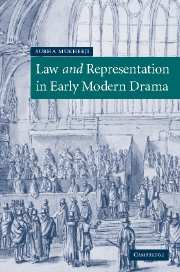Book contents
- Frontmatter
- Contents
- List of illustrations
- List of maps
- Acknowledgements
- Glossary
- A note on the text
- List of abbreviations
- Introduction
- 1 ‘Of rings, and things, and fine array’: marriage law, evidence and uncertainty
- 2 ‘Unmanly indignities’: adultery, evidence and judgement in Heywood's A Woman Killed With Kindness
- 3 Evidence and representation on ‘the theatre of God's judgements’: A Warning for Fair Women
- 4 ‘Painted devils’: image-making and evidence in The White Devil
- 5 Locations of law: spaces, people, play
- 6 ‘When women go to Law, the Devil is full of Business’: women, law and dramatic realism
- Epilogue: The Hydra head, the labyrinth and the waxen nose: discursive metaphors for law
- Appendix
- Bibliography
- Index
1 - ‘Of rings, and things, and fine array’: marriage law, evidence and uncertainty
Published online by Cambridge University Press: 18 December 2009
- Frontmatter
- Contents
- List of illustrations
- List of maps
- Acknowledgements
- Glossary
- A note on the text
- List of abbreviations
- Introduction
- 1 ‘Of rings, and things, and fine array’: marriage law, evidence and uncertainty
- 2 ‘Unmanly indignities’: adultery, evidence and judgement in Heywood's A Woman Killed With Kindness
- 3 Evidence and representation on ‘the theatre of God's judgements’: A Warning for Fair Women
- 4 ‘Painted devils’: image-making and evidence in The White Devil
- 5 Locations of law: spaces, people, play
- 6 ‘When women go to Law, the Devil is full of Business’: women, law and dramatic realism
- Epilogue: The Hydra head, the labyrinth and the waxen nose: discursive metaphors for law
- Appendix
- Bibliography
- Index
Summary
Renaissance drama is full of men and women with an uncertain and indeterminate marital status. Their numerous articulations of bewilderment or loss convey a sense of complex overlap between this specific indeterminacy and their personal identities. Katherine is, to William Scarborrow, in The Miseries of Enforced Marriage (1607), ‘She that I am married to, but not my wife’; to herself, ‘tho married’, she is ‘reputed not a wife’ (1004); Clare Harcop, meanwhile, occupies that peculiar position common to unlucky women in Renaissance England – ‘a Troth-plight-Virgin’ (785), wife enough to ‘be made a strumpet gainst [her] will’ (827) if she marries anyone but Scarborrow, yet not wife enough to be a legal impediment to his later, arranged marriage to Katherine. In Shakespeare's Measure for Measure, Mariana is ‘neither maid, widow, nor wife’ (V.i.177–8); Juliet is, as Claudio claims, ‘fast [his] wife’ (I.ii.128), but equally, the ‘fornicatress’ (II.ii.24) of Angelo's rigorous legal description.
The historical counterparts of figures such as these are to be met in surviving records of spousal litigation conducted in English church courts in the sixteenth and early seventeenth centuries. In May 1622 at Stratford, ‘Michael Palmer and his wife’ – acknowledged as a married couple even in the citation – are required to obtain ‘dismission … for … unlawful marriage and … enioyned penance … for incontinency before marriage’.
- Type
- Chapter
- Information
- Law and Representation in Early Modern Drama , pp. 17 - 54Publisher: Cambridge University PressPrint publication year: 2006



